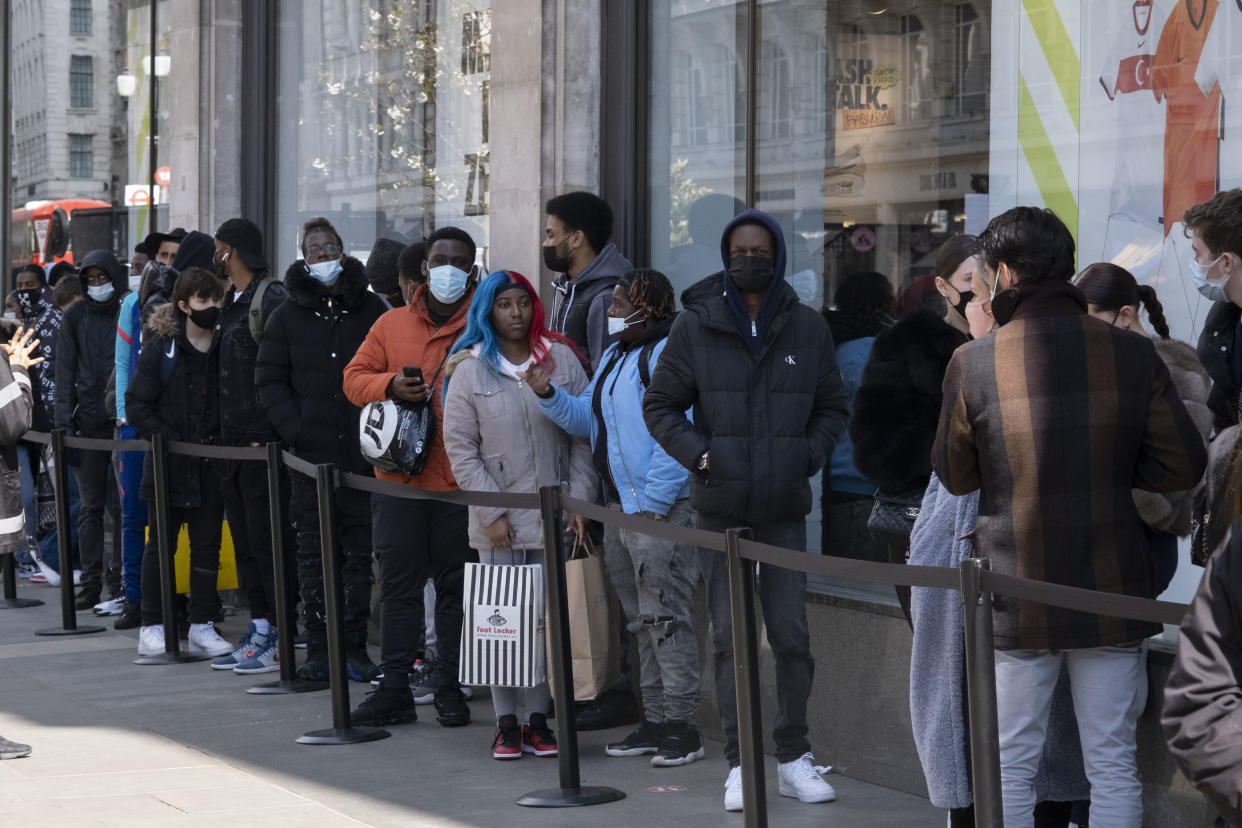FTSE lags despite retail sales and consumer confidence rising in April

London’s benchmark index lagged against its peers on Friday despite UK retail sales surging in April as people flocked back to physical stores.
The FTSE 100 (^FTSE) closed flat, having spent most of the day in the red thanks to a stronger pound(GBPUSD=X), while the French CAC (^FCHI) gained 0.7% and the DAX (^GDAXI) was 0.4% higher in Germany.
Data showed that retail sales jumped 9.2% last month compared with March, beating expectations, as non-essential shops reopened on 12 April.
Compared with April 2020, during the first national lockdown, sales were up 43%, according to the Office for National Statistics (ONS). Sales were also 9.9% higher than the last month of trading before COVID-19 hit.
Shoppers indulged in new clothes, including outerwear and knitwear, compared with previous shopping habits of wearing comfortable clothes and loungewear for indoors.
The easing of travel restrictions also saw a spike in fuel sales, with petrol stations seeing a 69.4% jump compared with March.
“Fewer virtual baskets were filled up, with online spending dropping 5.6% in April. The proportion spent online fell to 30% from 34% in March as real shopping trips took over from the trend of browsing in digital stores from the comfort of the sofa,” Susannah Streeter, senior investment and markets analyst at Hargreaves Lansdown, said.
“Retailers were in dire need of a spring sales boost after a long dark winter of lockdowns and the grand reopening delivered just that.”
Watch: What is a credit rating and why does it matter?
It came as a separate report showed that British consumers are optimistic about the UK economy amid the lifting of lockdown restrictions and the vaccination rollout.
The GfK Consumer Confidence Index improved to -9 in May from -15 in April, the highest since March 2020.
Joe Staton, client strategy director at GfK, said: “The financial mood of the nation has bounced back to its pre-lockdown figure of minus 9 this month, meaning confidence has made up all the ground lost to COVID-19”.
GFK’s gauge of optimism about the economic outlook over the next 12 months jumped by 15 percentage points.
In addition, IHS Markit/CIPS Flash UK Composite PMI showed on Friday that its measure of private sector growth hit the highest since the index began in 1998, with hotels, restaurants and other consumer-facing services posting the strongest demand.
This lifted IHS Markit’s purchasing managers index (PMI) to 62 in May, from 60.7 in April this year.
The reading for the UK's biggest sector — services, which has been hammered by the coronavirus crisis, rose to 61.8 from April’s 59.2, the highest rise since 2013.
Read more: 40% of UK firms expect fall in EU trade
Across the pond, the S&P 500 (^GSPC) gained 0.3% and the Dow Jones (^DJI) edged 0.7% higher at the time of the European close. The tech-heavy Nasdaq (^IXIC) dipped 0.1%.
On Thursday US markets had a resilient performance, with the Nasdaq hitting a two-week high, as stocks broke a three-day losing streak. Meanwhile. expectations that America will continue to stimulate its economy through very loose monetary policy, and high government spending, continues to weigh on the dollar.
Elsewhere, Asian markets fluctuated overnight as investors battled to follow a rally on Wall Street.
The Nikkei (^N225) climbed 0.8% while the Hang Seng (^HSI) remained flat and the Shanghai Composite (000001.SS) dipped 0.6%
Watch: What are SPACs?


